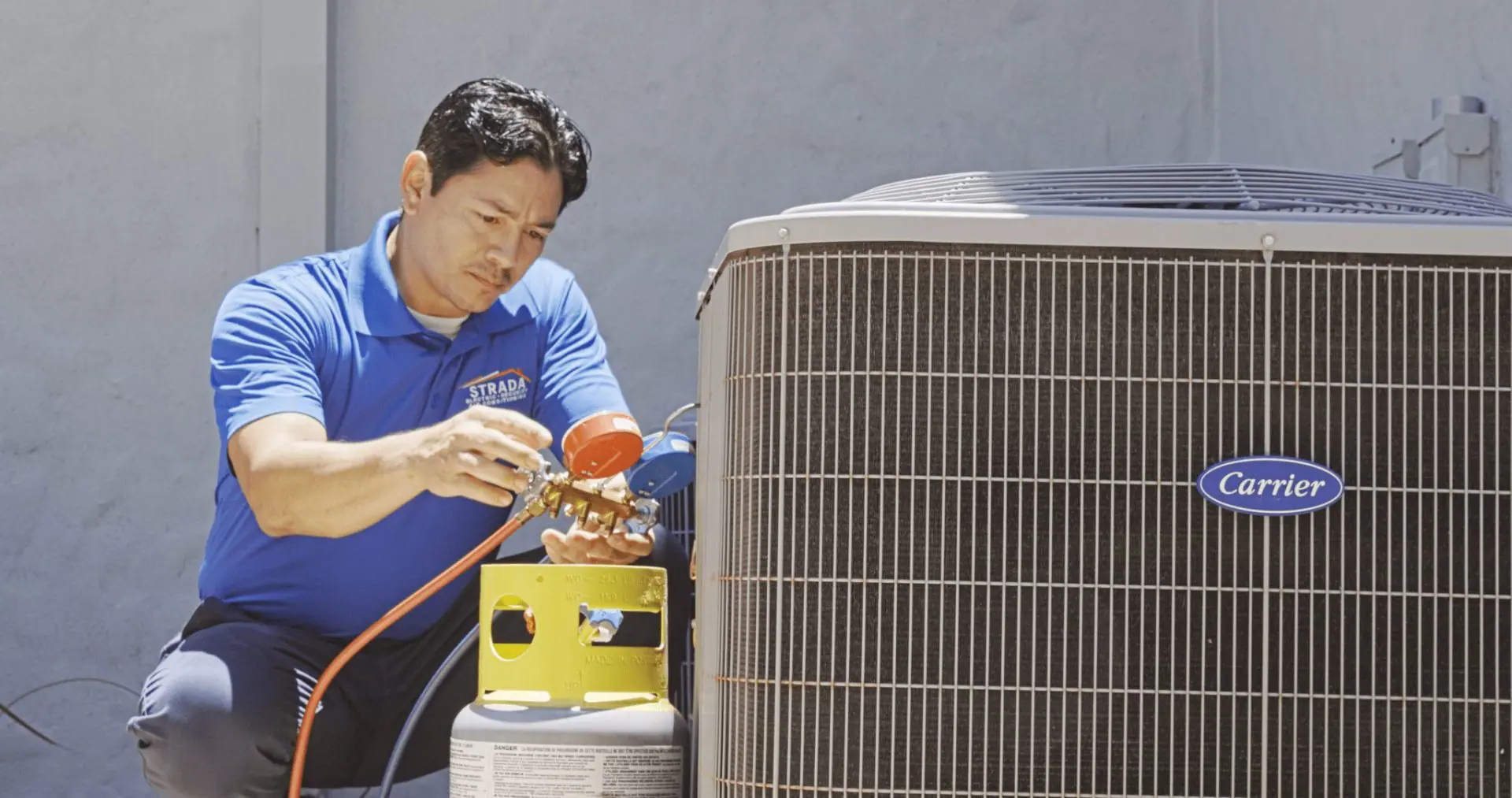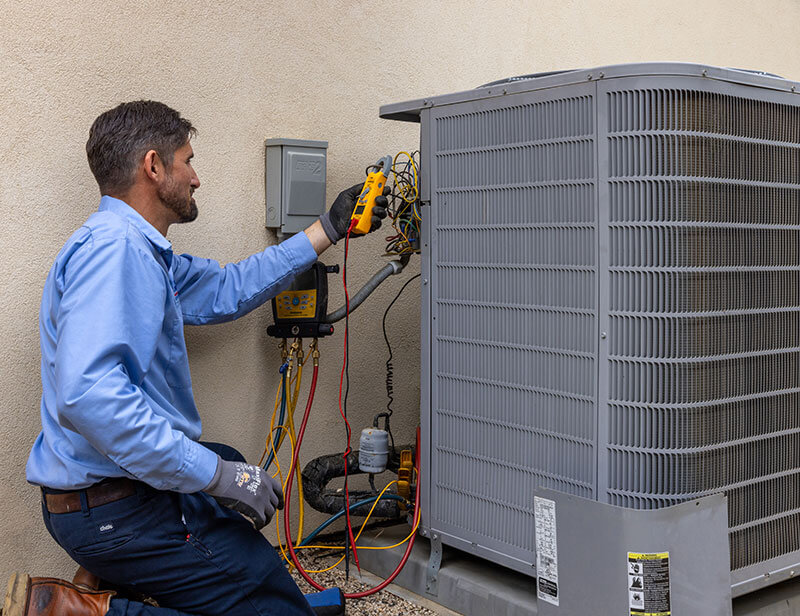Elevate Your Home’s Efficiency with Routine heat pump service
Elevate Your Home’s Efficiency with Routine heat pump service
Blog Article
Selecting Between a Heatpump and Furnace: Secret Factors To Consider for Your Cooling And Heating Requirements
When reviewing heating options for HVAC needs, the choice between a heatpump and a heater can be complex. Each system provides distinctive benefits tailored to certain environments and power efficiency objectives. Comprehending these differences is important for making an informed selection. Secret elements such as installment costs and environmental impact further make complex the choice procedure. Which alternative genuinely straightens with one's comfort and sustainability preferences? The complying with areas will discover these considerations in detail.
Understanding Warm Pumps: Exactly How They Function and Their Advantages
While several homeowners take into consideration numerous heating choices, understanding just how heatpump feature and their advantages can significantly affect their decision. Heatpump operate by transferring warm instead of generating it. In the winter, they draw out warmth from the outside air or ground and transfer it inside, while in the summertime, they reverse this process, cooling the home by expelling heat outside. This dual functionality makes them flexible for year-round climate control.One of the main advantages of heat pumps is their power performance. They use substantially much less electrical power contrasted to traditional heating unit, potentially leading to lower utility costs (heat pump installation ooltewah tn). In addition, warm pumps have a smaller carbon footprint, making them an eco-friendly choice. They also require much less maintenance than standard systems, adding to lasting expense financial savings. Generally, comprehending the technicians and advantages of warm pumps can aid property owners make educated choices concerning their home heating and cooling down requirements
Exploring Heating Systems: Kinds, Procedure, and Advantages
Heaters come in various kinds, consisting of gas, electrical, and oil designs, each with distinct operational devices. Recognizing these distinctions is essential, as they affect performance and heating performance. Additionally, heaters use various benefits, such as regular heat outcome and reliability in cooler climates.
Sorts of Heating systems
Heater can differ significantly in design and procedure, with heaters being a popular choice among property owners. There are several kinds of heaters, each utilizing various gas sources and technologies. Gas furnaces are common, leveraging gas to create heat efficiently. Electric heaters, on the other hand, use electrical resistance to create warmth, commonly preferred for their uncomplicated setup. Oil furnaces, while much less common, work in locations with limited gas gain access to (heat pump replacement ooltewah tn). Furthermore, condensing heating systems maximize energy performance by recording and reusing exhaust gases. Each kind operates via a system of heat exchangers and ductwork to distribute warm air throughout a home. Comprehending the distinctions in between these heater types is essential for notified cooling and heating choices
Advantages of Furnaces
For home owners seeking trusted warmth throughout cold months, the advantages of heating systems are significant. Furnaces give regular home heating, ensuring even temperatures throughout the home. They are specifically efficient in severe cool, commonly outshining warmth pumps in cold conditions. Various kinds, including gas, electric, and oil heating systems, supply flexibility to satisfy varied needs and preferences.Furnaces additionally often tend to have lower initial installation prices compared to heatpump, making them a much more easily accessible option for numerous. Their durable style contributes to a longer life expectancy, with several devices lasting over 15 years with correct upkeep. Furthermore, modern heating systems are usually geared up with innovative technology for boosted efficiency, which can cause lowered energy bills. Generally, heaters continue to be a dependable choice for reliable home heating.

Energy Performance: Contrasting Warm Pumps and Furnaces
When comparing energy performance in between heatpump and furnaces, the Seasonal Power Performance Proportion (SEER) plays a crucial role in identifying efficiency. Furthermore, a functional price evaluation exposes the long-term economic ramifications of each system. Recognizing these variables can direct homeowners in making notified decisions concerning their heating remedies.
Seasonal Power Efficiency Proportion
Energy effectiveness plays a crucial duty in the decision-making procedure between warm pumps and heating systems, particularly when taking into consideration the Seasonal Energy Efficiency Proportion (SEER) This metric procedures the cooling efficiency of warmth pumps over an entire cooling period, supplying a standardized way to examine efficiency. Greater SEER rankings indicate greater power effectiveness, converting to lower energy consumption and lowered energy bills. In comparison, heating systems are generally assessed utilizing the Annual Gas Use Effectiveness (AFUE) ranking, which mirrors heating efficiency. When contrasting these two systems, homeowners ought to prioritize SEER ratings for heatpump, as they directly effect overall energy financial savings and ecological sustainability. A complete understanding of SEER can notably affect the lasting satisfaction and cost-effectiveness of the picked a/c service.
Operational Price Evaluation
Understanding the functional costs connected with heatpump and furnaces is essential for property owners assessing their alternatives. Heatpump generally offer greater energy effectiveness, converting electrical energy into warm with minimal waste. This results in reduced month-to-month energy costs, specifically in modest environments. Alternatively, traditional heaters, particularly gas designs, may have lower in advance expenses however can sustain higher operational expenses with time because of sustain costs and efficiency ratings.Moreover, heatpump can operate as both home heating and cooling down systems, potentially decreasing the demand for different heating and cooling units. While preliminary investments for heatpump might be higher, their long-term savings in energy effectiveness can make them a more economical selection for numerous houses. Mindful analysis of neighborhood power prices is essential to establish the best alternative.
Installment Expenses: What to Expect for each and every Heating Unit
Installation expenses for heating systems can vary substantially between heatpump and heating systems, influencing property owners' decisions. Heatpump generally have higher ahead of time setup expenses, generally ranging from $3,500 to $8,000, depending upon the system dimension and intricacy of setup. This includes the outside system, indoor handling system, and needed ductwork modifications. Alternatively, heating systems tend to have lower first costs, balancing between $2,500 and $6,000, which can be appealing for budget-conscious house owners. Installation expenses can increase if considerable ductwork is required.Moreover, the option of gas type for furnaces-- natural gas, lp, or electric-- can also influence setup prices. While warm pumps use power performance, their first financial investment might prevent some buyers. Inevitably, examining installation costs alongside long-lasting savings and efficiency will help homeowners in making notified choices about their heater.
Climate Considerations: Which System Carries Out Much Better in Your Area
How do climate problems affect the performance of heating unit? The efficiency of heat pumps and heating systems can vary substantially depending upon the webpage regional climate. In modest environments, heatpump stand out by effectively transferring warmth from the outdoors air, making them an energy-saving alternative. Their performance decreases in extremely cool temperature levels, where they might struggle to extract enough warm. On the other hand, heating systems, specifically gas designs, provide regular and trusted heat no matter exterior conditions, making them better in chillier regions.In locations that experience milder winters, heatpump can run effectively year-round, offering both cooling and heating. On the other hand, areas with harsh winters frequently gain from the effectiveness of furnaces. Ultimately, comprehending the local environment is important when deciding between a heatpump and a heating system, as it straight influences their functional performance and overall performance.
Maintenance Demands: Long-Term Take Care Of Heat Pumps vs. Furnaces
While both heatpump and furnaces call for normal maintenance to assure peak efficiency, their specific demands and care routines vary significantly. Furnaces typically require much less constant attention, with yearly assessments being sufficient to look for gas leakages, tidy filters, and assess overall performance. Their easier style usually enables uncomplicated repairs.In contrast, heatpump necessitate semiannual upkeep because of their double duty in heating & cooling. This consists of cleaning coils, inspecting cooling agent levels, and making sure that both the interior and outdoor devices operate at their ideal. In addition, heatpump maintenance often involves more intricate components, making professional servicing essential.Neglecting upkeep can lead to reduced performance and raised energy costs for both systems. Ultimately, home owners should consider these long-lasting care requirements when selecting in between a heat pump and a heating system, as proactive maintenance can expand the life-span and performance of either system substantially.
Ecological Effect: Choosing a Lasting Home Heating Option
The ecological impact of home heating systems is a vital evaluation for house owners seeking lasting alternatives. Warmth pumps are typically extra energy-efficient than traditional furnaces, as they transfer warm rather than generate it, significantly reducing carbon discharges. By utilizing eco-friendly energy resources, such as geothermal or air-source warmth pumps, homeowners can further decrease their ecological footprint.On the other hand, all-natural gas heaters give off greenhouse gases and add to air contamination, though they often supply higher warm output. Nonetheless, developments in modern technology have actually caused the development of high-efficiency furnaces that decrease emissions.Ultimately, picking a heater includes weighing effectiveness versus ecological effect. House owners are motivated to review local power resources and incentives for eco-friendly systems, guaranteeing an option that lines up with both personal convenience and environmental obligation. The choice influences not just immediate comfort yet additionally lasting sustainability and ecological health and wellness.
Often Asked Questions
How Much Time Do Warmth Pumps and Furnaces Generally Last?
The life-span of heatpump typically varies from 15 to two decades, while heating systems can last in between 15 to thirty years. Normal maintenance considerably influences their long life and efficiency in supplying home heating services.
Can I Make Use Of a Warm Pump in Exceptionally Cold Climates?
Heatpump can operate in incredibly chilly climates, but their efficiency diminishes as temperature levels decrease. In such conditions, supplementary home heating sources may be needed to keep comfy interior temperatures and guarantee peak efficiency.

What Is the Sound Level of Warmth Pumps Versus Furnaces?
The noise levels of heatpump and heaters vary you could try these out significantly. Usually, warm pumps run even more quietly than typical heating systems, making them more suitable for those conscious seem, while heaters might create louder functional noises during heating cycles.
Are Heat Pumps Suitable for Both Heating & Cooling?
Heatpump are certainly ideal for both heating and cooling (heat pump installation ooltewah tn). They work by transferring warmth, providing efficient temperature level control year-round, making them a flexible option for house owners seeking an all-in-one a/c solution
What Size Furnace Do I Required for My Home?
Establishing the appropriate dimension home heating system for a home needs reviewing elements such as square video, insulation top quality, local climate, and the home's design. Consulting a professional can guarantee an exact assessment and perfect comfort. Warm pumps normally use greater power effectiveness, converting electrical power into warmth with very little waste. In modest climates, heat pumps stand out by effectively moving warmth from the outdoors air, making them an energy-saving choice. Alternatively, furnaces, particularly gas models, supply constant and trustworthy warm regardless of outside conditions, making them more effective in colder regions.In areas that experience milder winters months, warmth pumps can operate successfully year-round, supplying both home heating and cooling. Warm pumps are typically extra energy-efficient than traditional heaters, as they move warmth instead than create it, substantially lowering carbon emissions. By making use of sustainable energy sources, such as geothermal or air-source warm pumps, from this source property owners can additionally decrease their environmental footprint.On the other hand, natural gas heating systems send out greenhouse gases and add to air pollution, though they usually supply higher warm result.
Report this page